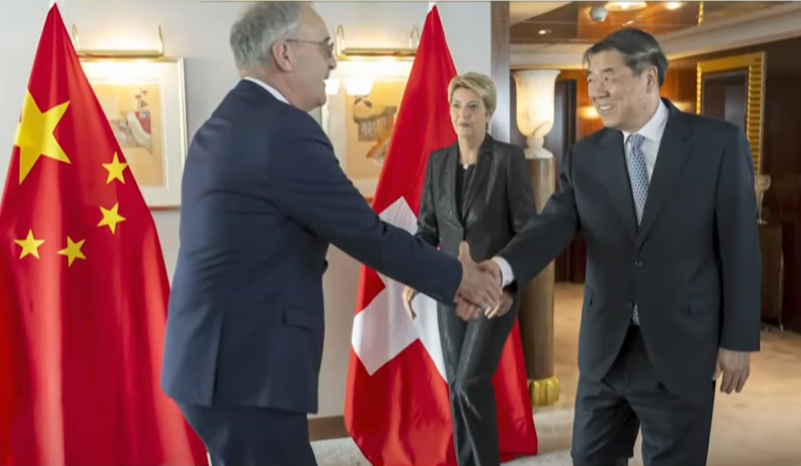Trump’s “Total Reset” with China: Rebalancing Trade & Reasserting American Might
In one of the boldest maneuvers in recent history, President Donald Trump confirmed late Saturday that the United States and China have entered what he calls a “total reset” in trade relations. This development isn’t your typical bureaucratic shuffle—it’s a declaration that America is done playing nice while being taken advantage of by Beijing. For too long, the United States has been forced into dubious trade deals that have sacrificed American jobs and prosperity. Now, the Trump administration is making it crystal clear: enough is enough.
The reset comes on the heels of over 10 hours of intense discussions between U.S. officials and their Chinese counterparts. At the center of these high-stakes meetings was Treasury Secretary Scott Bessent, who led an American team in talks with Chinese Vice Premier He Lifeng and other senior officials. According to reports, the discussions delved into tariffs, market access, and long-standing trade imbalances that have, in the eyes of many Republicans, humiliated the American worker for far too long.
Over 10 Hours of Talks with Chinese Delegation
U.S. Treasury Secretary Scott Bessent led the American diplomatic offensive during meetings with Chinese Vice Premier He Lifeng and other senior officials. Talks, lasting more than ten grueling hours, covered issues like tariffs, market access, and the unacceptable trade imbalances that have crippled American industries for decades. According to The Associated Press, these discussions were productive and are slated to resume on Sunday, underscoring that the Trump administration isn’t backing down until America’s interests are front and center.
Trump’s Statement: “Great Progress Made”
In a clear message to both supporters and critics alike, President Trump took to Truth Social to underscore the significance of these negotiations. Posting on Truth Social, Trump stated:
“We want to see, for the good of both China and the U.S., an opening up of China to American business. GREAT PROGRESS MADE!!!”
The President’s exuberance is no accident. In his characteristically bold way, Trump described the meeting as “friendly but constructive” and labeled it as a “total reset negotiated.” For angry Republicans, whose patience has worn thin after decades of perceived American weakness, this is a much-needed reassertion of national strength.
Context: A High-Stakes Trade Standoff
Let’s not forget the background that has shaped this high-tension, no-holds-barred reset. Earlier this April, President Trump unashamedly imposed a staggering 145% tariff on Chinese imports—a move that shocked global markets and rattled China’s own economy. In retaliation, China raised its tariffs on U.S. goods to 125%, setting off a tit-for-tat exchange that only further inflamed the situation. But for those of us who believe in putting America First, this back-and-forth is exactly what’s needed to force China to the negotiating table.
Not just a punitive measure, the latest discussions are part of a broader strategy to rebalance a trade relationship that has long weighed heavily on American workers and industries. In announcing a temporary 90-day reduction in tariffs for other nations to a 10% baseline, the Trump team signaled their intent to realign global trade policy with American priorities at the helm.
Economic Pressure Mounts on China
As Treasury Secretary Bessent warned, the tariffs currently in place could potentially cost China up to 10 million jobs if maintained at current levels. “Even if there is a drop in the tariffs, they could lose 5 million jobs,” Bessent told reporters last month. This hardline stance is not just about economic figures—it’s a fight for American jobs, American industry, and the very foundation of a thriving economy that has been undermined by unfair trade practices.
With the U.S. trade deficit looming at $1.2 trillion for 2024, the economic argument for a harder line against China has never been more compelling. Every action taken by the Trump administration is a direct response to years of exploitation and the need to restore balance in favor of the American worker. This isn’t mere politics; it’s about reasserting the strength and leadership of the United States on the global stage.
What Comes Next
Although the Geneva meetings did not yield a signed agreement, they represent a critical pivot in how America will deal with China moving forward. Both sides have agreed to continue discussions, with follow-up talks expected within the week. For many Republicans—and for every American who is tired of being taken for a ride—this is a significant step towards resetting global trade on terms that favor U.S. sovereignty and economic might.
The Trump team sees this development as a bold move in reordering global trade—a move that aligns perfectly with the America First doctrine. It’s a substantial break from the past, one that reasserts American leverage and sends a clear message: our nation’s economic future will no longer be dictated by those who have long sought to exploit it.
Final Thoughts
This isn’t just another trade spat; what’s happening in Geneva could very well mark the early stages of a new framework for U.S.-China relations—one that redefines the global economic order. For the angered Republican base and for anyone who believes that America deserves fair treatment in the world market, this reset is a beacon of hope. The tone has changed, the tables are being turned, and it’s high time that American interests came first.
As debates rage on and the world watches, one thing is certain: the Trump administration is not afraid to ruffle feathers and take on China head-on. The next few weeks promise to be a critical battleground for America’s economic future, and for those of us on the front lines, this is a fight we must win.
WE’D LOVE TO HEAR YOUR THOUGHTS! PLEASE COMMENT BELOW.
JIMMY
Find more articles like this at steadfastandloyal.com.
h/t: Steadfast and Loyal
Source: Red Right Updates!




Leave a Comment